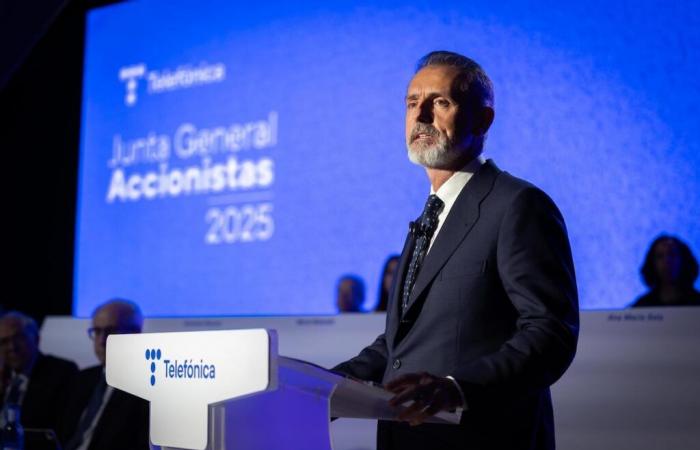The president of Telefónica, Marc Murtra, is analyzing a personnel adjustment between 4,000 and 5,000 people in Spain to reduce the structure costs of the group and improve their efficiency. The adjustment would be carried out by means of an employment regulation file (ERE) in the line of the agreed with the unions in 2024 and that supposed the exit of 3,421 workers, under the mandate of its predecessor in the position, José María Álvarez -Pallete.
The difference with the previous plans is that the one who projects Murtra is being agreed with the government, the first shareholder of Telefónica since last year the State Society of Industrial Participations (SEPI) took 10% of the company with an investment of 2,284 million euros, according to publishes The confidentialwho has advanced the news. The company has declined to comment on the information.
The ERE would be raised within the “strategic review” of the business plan that Murtra promised that he would present in the second half of the year with the aim of saving costs and achieving a more agile management of the company. The adjustment, in case of materializing, would not be immediate and must also have the agreement of the majority unions. The current collective Agreement of Linked Companies (CEV) of Telefónica Blinda the labor guarantees of the workforce until December 31, 2026, including the commitment that any adjustment measure must have the union support.
The chosen formula would be the same as in the last adjustment of 2024, namely an ERE, instead of the so -called individual separation plans (PSI) that the company has used to lose weight the workforce in about 20,000 troops since 2008. These PSI have the advantage that the worker is still linked to the company with the same social benefits, and can even return to it in case he decides to rethink their situation. The disadvantage in front of the ERE is the worst fiscal treatment of compensation so the unions requested in the last adjustment to return to the formula of the regulation file.
The UGT, CC OO and Added-Feetic Telefónica’s unions signed an agreement on the ERE for 3,421 workers, 21% of the staff of 16,000 employees of the three companies affected in Spain (Telefónica España, mobiles and solutions). The cost was estimated at 1.3 billion euros (before taxes) and the company calculated annual average savings of expenses of 285 million euros from 2025.
As for economic conditions, those born in 1968 received 68% of the regulatory salary up to 63 years and 38% to 65; Those born in 1967, 1966, 1965 or 1964, will go with 62% of the salary up to 63 years and 34% to 65, and a premium for voluntariness to 10,000 euros for this section; and those born in 1963 or previous received 52% of the salary up to 63 years and 34% to 65, with the same voluntariness premium. In the accessories chapter, the ERE included reversibility of income (in case of death, legal heirs will receive pending income), payment of the employee’s social security discount during unemployment, and collective insurance up to 63 years (and up to 65 years for survival).
Previously, Telefónica applied a PSI in 2021 to which 2,418 workers were accepted, with a cost of around 1.4 billion euros. Subsequently, another casual plan in 2019 applied for which some 2,600 employees were separated from the operator, with a cost of 1.7 billion euros. The previous low plan dates back to 2015, which was the departure of 6,300 workers at a cost of almost 3.7 billion euros. However, the largest adjustment was executed by César Alierta as president between 2011 and 2012, with the departure of 6,800 workers and a cost for the company of 2,700 million euros.
Murtra, who participated on Monday in the organized days of Calle d’acomia in Barcelona, made no reference to the ERE.
Reduction of Council Remuneration
In addition to this template reduction, Murtra wants to collect the demand made by the great funds at the last shareholders meeting on the excessive remuneration of the Board of Directors. The president of the operator, as already suggested in the response shift of the Board, would be preparing a reduction of these emoluments, including his as president. Precisely, the point of the agenda that aroused less support was the annual remuneration report of the Council, which was approved with 72.3% of the votes in favor, the rejection of 11.6% of the shareholders and the abstention of 15.9%.
On May 14, Murtra will present the first results since he is president corresponding to the first quarter of 2025, in which the company is expected to present strong losses due to the provisions for the sale of the Argentine subsidiary, which will have a negative impact on the accounts of the operator of 1,107 million euros.
UGT reaction
From UGT they have pointed out that they have not received any communication, “neither official nor informal, from the company that aims towards an employment adjustment process such as the one that the media poses.” For the union, “the arrival of Marc Murtra to the presidency of the group and the entry of the Government of Spain to his shareholders must mean an opportunity to renew commitments and reinforce the strategic position of the staff, not to turn it into adjustment variable.”
The organization points out that they are waiting for “the new president to transfer his vision of the future in a clear and responsibility for working people, but, in any case, UGT would consider unacceptable that business sustainability was projected again only from the optics of the template cuts.”
“We will not tolerate that a strategic company, with experienced professionals and good working conditions, participated by a progressive government does not bet on long -term and quality employment. Nationalization is not compatible with the destruction of employment,” UGT reiterates in the statement.
Along the same lines, the added-feetic union has confirmed that, although the company has not summoned the unions to negotiate anything in this regard, its position remains the one maintained in the previous ERE, that is, that any personnel exit of personnel is universal and voluntary and that the economic conditions are, at least, the same.






